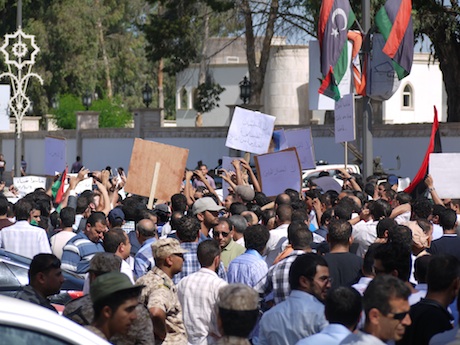By Hadi Fornaji.

Tripoli, 12 November:
The National Congress has passed new legislation regulating the conditions under which citizens can hold public protests.
Whilst . . .[restrict]guaranteeing what it calls the “fundamental human right” of citizens to protest, the law obliges organisers of demonstrations to inform the authorities of their intentions at least 48 hours in advance and to maintain discipline during the event itself.
“All planned demonstrations must have a leader and at least two members whose names must be listed in the notice given to the security directorate stipulating where the demonstration will be taking place”, reads Law No. 65.
“This committee is under obligation to maintain law and order during the demonstration and to forbid the delivering of speeches which undermine law and order, morality, or encourage crime.”
Organisers are also obliged to send written notice of the date, time, gathering area, set-off-time, route and the time when the demonstration is expected to end.
In a potential effort to restrict protests designed to shut down public amenities such as oil refineries the law also stipulates that demonstrations do “not lead to regular or steady obstruction of public facilities”.
Protesters are also forbidden from carrying a weapon of any kind, with a weapon defined as any object “considered to be dangerous to the general public”.
Failure to comply with these regulations could result in the authorities preventing the protest from going ahead, whilst organisers risk a maximum six-month jail sentence and 5,000 dinar fine. These punishments can be doubled in the case of those also found in possession of a weapon, even if the person holds a license to carry such a weapon.
The authorities now reserve the right to change the time, locations and route of any protest in the interests of “security, safety and public order reasons”, including “to prevent any likely obstruction of state interests” as well as to prevent damage to public and private assets.
For their part the authorities are “under obligation to provide security during the demonstration, and to provide help and support within the laws, regulations and legislation in force”.
Moreover, the law forbids the authorities from banning any demonstration, “except if the said demonstration is likely to cause public disorder”.
In the case of a demonstration being banned, at least one of the organisers must be informed of the decision at least 12 hours prior to the scheduled starting time and a copy of the notification ban must be displayed on the wall of the responsible authorities’ building. Where possible, the decision should also be published in local newspapers.
Demonstration organisers have the right to make a formal complaint to the Ministry of Interior should a protest be banned for any reason.
The law was signed into force by the National Congress on 6 November 2012. [/restrict]






